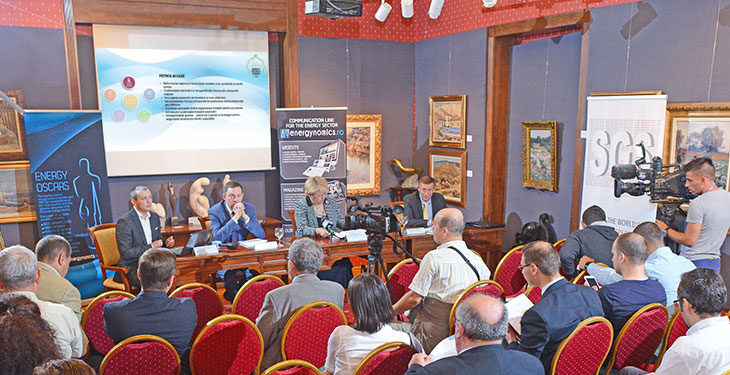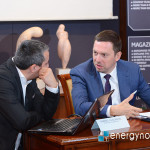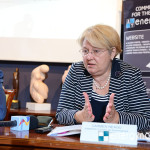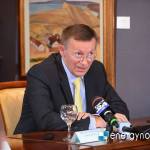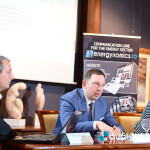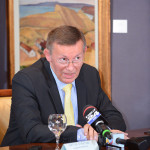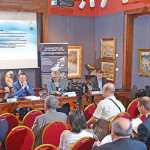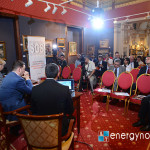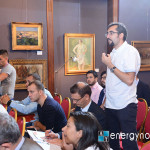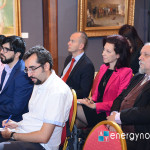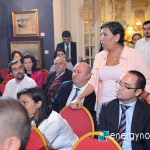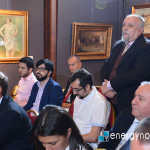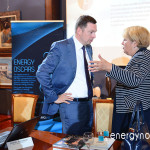The update of the national energy strategy has entered a new phase along with the Ministry of Energy’s decision to hand over this task to a consulting company, which it will select in the following period. Not a bad idea, believes Martin Zmelik, CEO and country manager of CEZ Romania, as the consulting expertise, including other European economies, can bring added value to this document. For most representatives of the energy industry, even more than the document itself, it is essential to have a permanent communication between the authorities and the employers associations in the sector.
DOWNLOAD THE 2015 ENERGY STRATEGY SUMMIT REPORT
The press conference launching the report of the Energy Strategy Summit 2015 officially occasioned a new debate on the form that the national energy strategy should have. The speakers at the event were: Martin Zmelik (CEO CEZ Romania), Carmen Neagu (Chairman of the Supervisory Board of Transelectrica) and Artur Stratan (President of ROPEPCA). The assistance was attended by officials from the NAMR (National Agency for Mineral Resources), representatives of ACUE, WEC, ROPEPCA and embassies of the Netherlands and the United States and the European Commission in Bucharest. Among the companies present were the CEZ Romania, CEZ Trade, Conpet, Eco Solution, EFK, Enel Green Power, KPMG Romania, McGuire Woods, SGS Romania, Transelectrica, Valma, Verbund, Vestas, WPD Romania. The press conference attracted the interest of journalists from Adevarul, Agerpres, Bloomberg, Digi24, Energy Center, Focus Energetic, Mediafax, TVR, Ziarul Financiar.
The discussion was opened by Gabriel Avăcăriţei, editor of energynomics.ro, organizer of the 2015 Energy Strategy Summit, the largest consulting companies in the Romanian energy industry, held on June 4, at Busteni. The 2015 Energy Strategy Summit resulted in a formal report which brings together the key elements of the future Romanian energy strategy from the perspective of the business environment.
Gabriel Avăcăriţei expounded briefly the main ideas selected from the speeches of the 23 speakers at 2015 Energy Strategy Summit. Among these, several imperatives:
Charge profits and not investing !
Predictability in legislation and regulation
Consultation between authorities and companies
DOWNLOAD THE PRESENTATION OF GABRIEL Avăcăriţei
In his speech, Martin Zmelik addressed the role of national energy strategy. “The energy strategy needs a redrawing, considering all the external changes in the industry, the market opening, and the upcoming new technologies. The state’s position regarding for the industry is important, not just with some general statements, but with very specific short, mid-term and long term achievements that can be measurable. This is important for everyone, not only for the investors and the companies, but also for the state authorities, and for the consumers.
What is the future for the sector in Romania, and what are the decisions and guidelines that we might follow? At the moment, most significant element that is missing in the industry is the predictability. There are so many open issues and contradictory approaches that the most difficult thing at the moment is to really predict and prepare the strategy according to the market, and even more so for the utilities business where some parts of the processes are heavily regulated. You can not be regulated and still facing a lot of external factors that are not reflected in the strategy, in the legislation and in other approaches.
What we are expecting in the end is a clear commitment on what is the strategy for the country, what are the priorities and how the energy industry can answer to these priorities.
For our industry, it is clearly defined what are our duties according to legislation and all the big players are following these ground rules. But what is really still missing is what are some incentives for us to develop a long term strategy. And it is not necessarily about improving the economical framework. It is more about stability and the direction that I might follow. Let’s talk about the [electricity] distribution business. Am I expected to run a low cost distribution company that will be focusing more on the price at the level of end-consumer, or are we going also to adopt some new legislation, new upcoming directions from EU introducing new technologies and also improving the quality? There are two contradictory directions that need to be somehow balanced and addressed. This is just an example to explain why we need to somehow define the expected role of each player in the market“.
In turn, Carmen Neagu resumed the plea for an increased focus on the thermic energy, as a fundamental sector through the social impact and the efficiency potential it presents.
“I want to congratulate energynomics.ro for organizing the event at Busteni, but also because it has completed what happened there, that there is a document that will be distribuited and will be available for the authorities.
I want to go back to the thermic energy, because I insisted that it should be an important element of the strategy, because 50% of the energy balance of a country is the district heating. Winter comes and we see how important this element is in the energy strategy. In addition, it is an area of great potential for energy efficiency, but also to meet the requirements of flexibility of some energy systems. Until the construction of storage capacities, the development of cogeneration capacity can meet the needs of flexibility flexible energy system.
Until the construction of storage capacities, the development of cogeneration capacity can meet the needs of flexibility flexible energy system.
I liked very much the intervention of John M. Roberts namely the idea that a country’s energy strategy is about making choices, about taking choices. Beyond all means the trade and alignment with the EU, regional or global strategy means a set of choices to meet the energy and economic needs of Romania. Given the global context, Romania must make choices that fit. We are talking about an energy hub. What does this mean? A manufacturer, supplier or vendor resources in the area? A higher valued energy supplier? A technology provider? It requires a comprehensive vision and then a choice. This requires dialogue and continuously applied between all parties involved.”
Artur Stratan, president of the Romanian Association of Petroleum Exploration and Production Companies (ROPEPCA) insisted to continue the dialogue between the authorities and companies. “There are many things to say, and the time restraints of the summit, however well intended, are not all arguments that can be presented comprehensively. Thus, my admonition to energynomics.ro is that when you hand over this report to the authorities, add and recommendation that in future they continue consulting the companies from the industry.
We would like very much to create an environment for dialogue, where organizations and business and industry representatives have the opportunity to speak and make viable recommendations.
From our point of view, the previous strategy was created by politicians without prior consultation with business and therefore not viable. Recommendation for the future is for the authorities to consult with us.
Any strategy has two main components; it must establish long-term objectives and then the ways, the means of achieving those objectives. In setting goals, the government must be very clear about what he wants to achieve in the long term. Upstate industry want to save oil and gas? It wants Romania’s energy independence? It wants Romania to become a regional energy provider? There are many questions and possible targets, there are many proposals that may come both from the political and business environment.
On the oil and gas industry, we raise a question first. We are a survival strategy or a development strategy? If we want a survival strategy, not much will change neither in legislation nor the regulations and rules. Any strategy to be viable, must be well represented by the law to be applied.
A development strategy would require completely different things. It involves a lifeline for the oil and gas industry with which to be reborn.”
Following the press conference, several press articles were published including:
Neagu (Transelectrica): The Increases in energy exports lately may raise domestic production needs
Stratan (ROPEPCA): The new royalty law could come into force from 1 January 2017; increasing royalties would be catastrophic for the industry
The new hydrocarbon tax system cannot be applied from January 2016. Companies in the sector are still waiting on royalties bill
Stratan, ROPEPCA warns increased fees, deposits closed! The new law royalties from January 2017
One of the most important regulations for the country’s budget: Law royalties, only in 2017?
Organized by energynomics.ro, the 2015 Energy Strategy Summit brought together over 120 participants and was attended by 23 leading representatives of the companies and the authorities in the energy industry.
